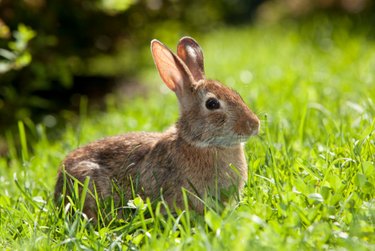
A food chain is a cycle in nature of different organisms eating or consuming one another in order to survive. Each food chain ends with a top predator, and begins with a primary energy source or basic plant or animal. There are a handful of food chains that begin with grass and end with humans as the top predator.
Cows
Video of the Day
Cows are in a simple food chain that begins with grass and ends with humans. This food chain example is simple: the chain starts with grass. Cows eat the grass, then humans eat the cows. Humans are the top predator. This food chain is often manufactured in nature by humans at beef and cattle ranches. Humans provide a field of grass for cows to graze, and when the cows reach a certain age or weight, they are killed and sold as beef for people to consume.
Video of the Day
Rabbits
Similar to cows, rabbits are part of another simple food chain. The rabbits eat the grass, and humans eat the rabbits. While rabbits might not be a common protein served in your household, they are eaten frequently in different parts of the world. People in many European countries eat rabbit regularly, and rabbit is sometimes served as the main course for holidays or special occasions.
Wheatgrass
Wheatgrass is a type of grass that is part of a very short food chain. Humans grow wheat grass, then consume it, often in the form of juice. Wheatgrass provides many nutritional benefits, including high doses of vitamins C, E, K and B, as well as 17 amino acids and many minerals. Wheatgrass also provides an energy boost and helps with weight control, boosts your immune system, helps regulate blood sugar and provides many other health benefits. One or two ounces of wheatgrass juice per day is enough to benefit from its consumption.